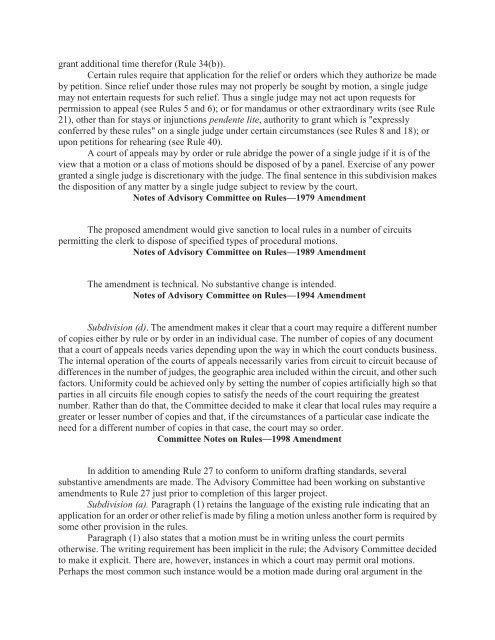Federal Rules of Appellate Procedure 2014-2015, 2014a
Federal Rules of Appellate Procedure 2014-2015, 2014a
Federal Rules of Appellate Procedure 2014-2015, 2014a
Create successful ePaper yourself
Turn your PDF publications into a flip-book with our unique Google optimized e-Paper software.
grant additional time therefor (Rule 34(b)).<br />
Certain rules require that application for the relief or orders which they authorize be made<br />
by petition. Since relief under those rules may not properly be sought by motion, a single judge<br />
may not entertain requests for such relief. Thus a single judge may not act upon requests for<br />
permission to appeal (see <strong>Rules</strong> 5 and 6); or for mandamus or other extraordinary writs (see Rule<br />
21), other than for stays or injunctions pendente lite, authority to grant which is "expressly<br />
conferred by these rules" on a single judge under certain circumstances (see <strong>Rules</strong> 8 and 18); or<br />
upon petitions for rehearing (see Rule 40).<br />
A court <strong>of</strong> appeals may by order or rule abridge the power <strong>of</strong> a single judge if it is <strong>of</strong> the<br />
view that a motion or a class <strong>of</strong> motions should be disposed <strong>of</strong> by a panel. Exercise <strong>of</strong> any power<br />
granted a single judge is discretionary with the judge. The final sentence in this subdivision makes<br />
the disposition <strong>of</strong> any matter by a single judge subject to review by the court.<br />
Notes <strong>of</strong> Advisory Committee on <strong>Rules</strong>—1979 Amendment<br />
The proposed amendment would give sanction to local rules in a number <strong>of</strong> circuits<br />
permitting the clerk to dispose <strong>of</strong> specified types <strong>of</strong> procedural motions.<br />
Notes <strong>of</strong> Advisory Committee on <strong>Rules</strong>—1989 Amendment<br />
The amendment is technical. No substantive change is intended.<br />
Notes <strong>of</strong> Advisory Committee on <strong>Rules</strong>—1994 Amendment<br />
Subdivision (d). The amendment makes it clear that a court may require a different number<br />
<strong>of</strong> copies either by rule or by order in an individual case. The number <strong>of</strong> copies <strong>of</strong> any document<br />
that a court <strong>of</strong> appeals needs varies depending upon the way in which the court conducts business.<br />
The internal operation <strong>of</strong> the courts <strong>of</strong> appeals necessarily varies from circuit to circuit because <strong>of</strong><br />
differences in the number <strong>of</strong> judges, the geographic area included within the circuit, and other such<br />
factors. Uniformity could be achieved only by setting the number <strong>of</strong> copies artificially high so that<br />
parties in all circuits file enough copies to satisfy the needs <strong>of</strong> the court requiring the greatest<br />
number. Rather than do that, the Committee decided to make it clear that local rules may require a<br />
greater or lesser number <strong>of</strong> copies and that, if the circumstances <strong>of</strong> a particular case indicate the<br />
need for a different number <strong>of</strong> copies in that case, the court may so order.<br />
Committee Notes on <strong>Rules</strong>—1998 Amendment<br />
In addition to amending Rule 27 to conform to uniform drafting standards, several<br />
substantive amendments are made. The Advisory Committee had been working on substantive<br />
amendments to Rule 27 just prior to completion <strong>of</strong> this larger project.<br />
Subdivision (a). Paragraph (1) retains the language <strong>of</strong> the existing rule indicating that an<br />
application for an order or other relief is made by filing a motion unless another form is required by<br />
some other provision in the rules.<br />
Paragraph (1) also states that a motion must be in writing unless the court permits<br />
otherwise. The writing requirement has been implicit in the rule; the Advisory Committee decided<br />
to make it explicit. There are, however, instances in which a court may permit oral motions.<br />
Perhaps the most common such instance would be a motion made during oral argument in the


















